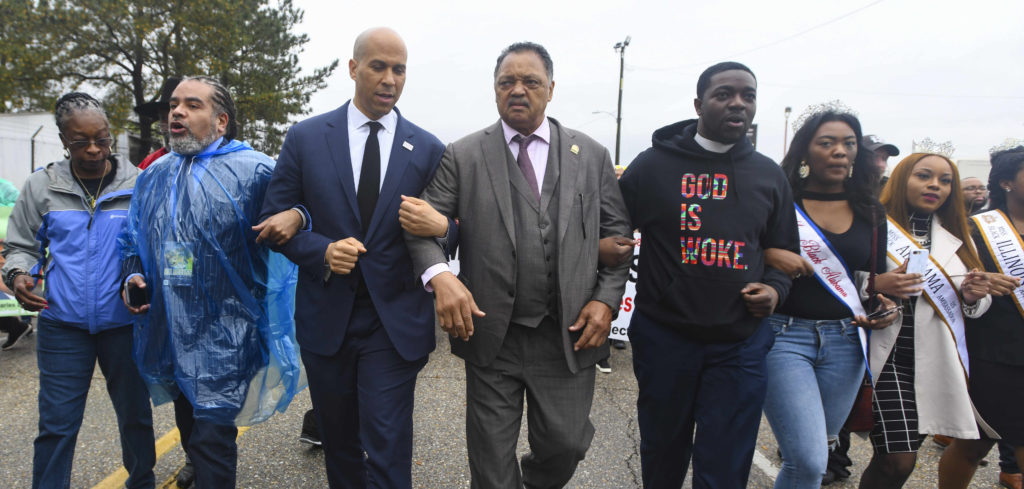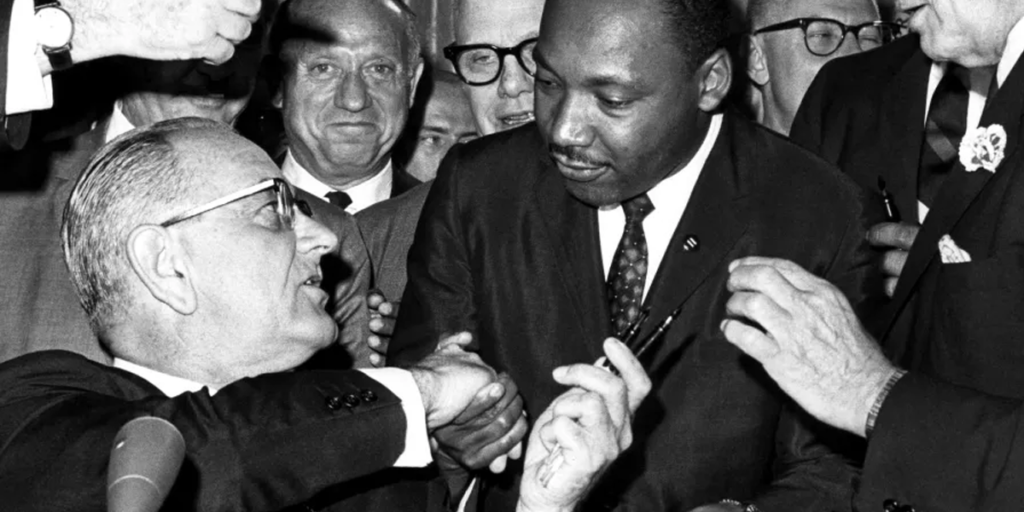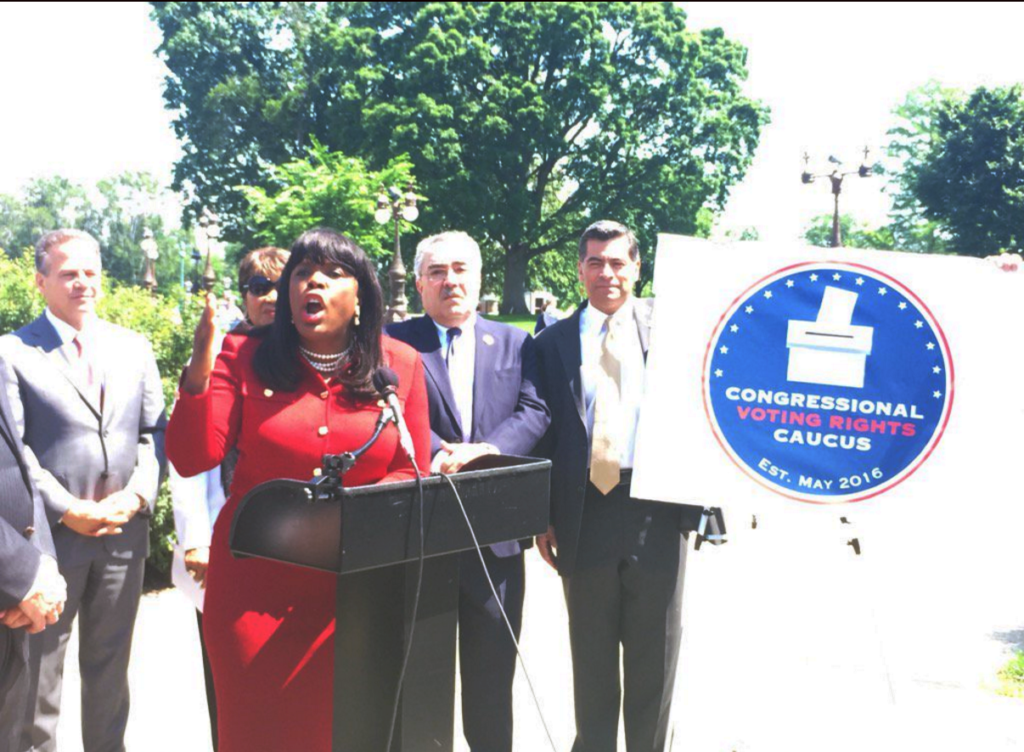Democratic presidential hopefuls honor Selma march

Thunder rolling above Brown Chapel AME Church, Democratic presidential candidate Cory Booker warned Sunday of a looming threat to American democracy and called for protecting the legacy of the civil rights movement with love and action. “It’s time for us to defend the dream,” Booker said in a keynote speech at Brown Chapel, which two generations ago was the starting point of a peaceful demonstration in support of voting rights that ended in beatings on the Edmund Pettus Bridge. The infamous “Bloody Sunday” on March 7, 1965, galvanized support for the passage of the Voting Rights Act that year. “It’s time that we dare to dream again in America. That is what it takes to make America great. It is up to us to do the work that makes the dream real,” said Booker, a New Jersey senator and one of three White House hopefuls who participated in events commemorating the march. Saying America faces challenges, Booker said: “People want to make it just about the people in the highest offices of the land. . People who traffic in hatred, people in office that defend Nazis or white supremacists, people that point fingers and forget the lessons of King. What we must repent for are not just the vitriolic words and actions of bad people, but the appalling silence and inaction of good people.” Also visiting Selma on Sunday were Sens. Bernie Sanders of Vermont and Sherrod Brown of Ohio. Joining them was Hillary Clinton, the Democratic nominee in 2016. Booker and Brown, along with Clinton and civil rights leader Jesse Jackson, marched with dozens of others Sunday afternoon to Edmund Pettus Bridge. Sanders had left for a campaign event in Chicago. The throng of marchers had set out from the church and sang freedom songs under a stormy sky as they headed to that sacred spot over the Alabama River to commemorate the peaceful protesters who were met with tear gas and clubs wielded by state troopers. This year’s commemoration came in the early days of a Democratic presidential primary campaign that has focused heavily on issues of race. Several candidates have called President Donald Trump a racist, while others have voiced support for the idea of reparations for the descendants of enslaved black Americans. Booker and Sanders have already announced their campaigns. Brown is still considering a White House bid. The three gathered for a unity breakfast in Selma to pay homage to its civil rights legacy and highlight how the movement shaped their personal narratives. For the New Jersey senator, much of the day felt personal. In Brown Chapel he sat next to Jackson, for whom he cast his first ballot as an 18-year-old during Jackson’s 1988 presidential campaign. He later marched to the bridge alongside Jackson, their arms locked together. In his speech, Booker linked the 1965 Selma demonstration to the lawyer who volunteered to help his family buy a home in a white neighborhood after they were discriminated against and repeatedly denied. “I would not be here if it wasn’t for marchers on a bridge who inspired a man a thousand miles away in New Jersey,” he said. “The dream is under attack. You honor history by emulating it, by us recommitting ourselves to it.” Brown, currently on a “Dignity of Work” tour inspired by King, returned to Selma for the fifth time. He frequently draws connections between civil rights and worker’s rights. A former secretary of state in Ohio, Brown also has a reputation as a leader on expanding voter participation. “We need to understand what happened here and we need to talk about it so we keep fighting on these issues,” Brown told reporters at the breakfast. “It’s clear we make progress and then we fall back because of Republican attacks on voting rights.” Claiming that the Georgia governor election was stolen from Democrat Stacey Abrams, Brown said: “It’s not just a Southern issue, of course. In the north we see all kinds of changes in voting laws. We see suppression of the vote in 2016, purging of voters in my state in a big way. This fight continues. It’s become personal in many ways because voting rights are so important to our country.” Sanders attended the 1963 March on Washington, which featured the Rev. Martin Luther King Jr.‘s “I Have A Dream” speech. Sanders has highlighted his civil rights and activist background as a young man at the University of Chicago. He is working to strengthen his relationship with black voters, with whom he struggled to connect in the 2016 Democratic primary that Clinton won. Appearing at Chicago’s Navy Pier, Sanders on Sunday night recalled his work with the campus chapter of the Congress of Racial Equality, protesting discrimination and housing segregation. He led one of the first sit-ins in the North and was arrested at a demonstration against segregation in Chicago schools in 1963. Sanders said while the Chicago activism was significant at the time, it didn’t compare to what was happening in the South. “We were protesting,” he told a rally of thousands. “They were putting their lives on the line, and some were getting killed.” “I must say that it is incomprehensible to me that, in the year 2019, we continue to have a president, a Supreme Court and Republican governors who still are trying to deny people of color and poor people the right to vote,” he said. “The reason I tell you all of this is because my activities here in Chicago taught me a very important lesson,” he said. “And that is that whether it is the struggle is against racism, or sexism, or homophobia, or corporate greed, or environmental devastation, or war and militarism or religious bigotry — real change never takes place from the top on down. It always takes place from the bottom on up when people, at the grassroots level, stand up and fight back.” In Selma, Clinton told those at Brown Chapel that the absence of crucial parts of the
On its 53rd anniversary, Terri Sewell says Voting Rights Act must be restored

Monday, August 6, marks the 53rd anniversary of the enactment of the Voting Rights Act of 1965 (VRA). The VRA abolished restrictions on black Americans voting in federal, state and local elections. In 2013, key components of the law were removed by the Supreme Court in its Shelby County v. Holder decision. Alabama 7th District U.S. Rep. Terri Sewell on Monday said the the law must be restored. “Today’s anniversary is a reminder that foot soldiers in Alabama and across the country fought, bled, and died for our right to vote,” saidSewell. “Right now, their work is under attack as states across the country pass strict voter ID laws, gerrymander electoral districts, and purge voters from their voter rolls. As we recognize the impact that Shelby County v. Holder has had on our democracy and its damaging effect on voter access, let us recommit to action in the face of voter suppression. We must restore the full protections of the Voting Rights Act to keep our elections free and fair. In June 2017, Sewell sponsored the Voting Rights Advancement Act (VRAA), which seeks to restore full protections to the Voting Rights Act of 1965 following Shelby County v. Holder. To address the Supreme Court’s concerns with the VRA, the VRAA would create a new coverage formula which requires federal oversight of states with repeated voting rights violations in the last 25 years. If passed, 13 states nationwide, including Alabama, would be subject to federal election oversight due to a recent history of voter discrimination. It would also require states with a recent history of voter discrimination to seek approval from the Department of Justice before making any changes to their electoral laws.
Terri Sewell to co-chair Congressional Voting Rights Caucus

U.S. Rep. Terri Sewell, Alabama’s lone Democratic in Congress, can add another title to her already impressive resume: co-chair of the newly formed Congressional Voting Rights Caucus. Created in response to the alleged voter suppression tactics enacted by states since the Supreme Court struck down key provisions of the Voting Rights Act in its 2013 Shelby v. Holder decision, the Caucus held its first press conference Tuesday to announce its formation. According to the caucus’ website, it will work to “help educate the public about their rights as voters, advance legislation that blocks current and future suppression tactics and brainstorm creative ways to bring our election process into the 21st Century.” “A democracy means nothing w/o every American having the same access to the ballot box,” Sewell said on Facebook after the press conference. Co-chaired by Sewell and U.S. Rep. Marc Veasey of Texas, the caucus already boasts 49 members, including well-known Democratic U.S. Reps. Sheila Jackson Lee of Texas and Elijah Cummings of Maryland.

